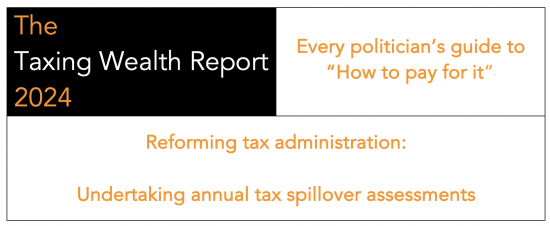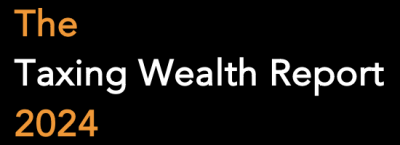I have this morning published the next in my series of proposals that will make up the Taxing Wealth Report 2024.
In this latest note, I suggest that if the UK tax system is to be properly administered it not only needs regular appraisal of its tax gap on a comprehensive basis, but also requires that regular tax spillover assessment be undertaken to ensure that the required measures to address the issues revealed by that tax gap appraisal are identified.

The summary to the note that supports this recommendation says:
Brief summary
This note suggests that:
- The UK should undertake annual tax spillover assessments.
- Tax spillover assessments identify the ways in which one part of a tax system undermines another part of that same tax system, or that of another country, meaning that the expected amount of tax is not paid as a result.
- Tax spillover assessments do, as a result, complement proper tax gap assessments by highlighting why it is likely that anticipated tax revenues are not paid.
- Tax spillover assessments should, by their nature, set out an agenda of legislative reforms to the tax system that will result in it working to best effect.
- If a government sets out to generate a fixed sum in revenue and tax spillover assessments can identify the best way for it to do this at lowest cost then:
- Cost of tax administration should be minimised
- Tax avoidance should be reduced
- Overall tax yields should rise if tax rates are not cut
- Tax rates could be cut
- Overall, horizontal and vertical tax equity should increase
- Taxpayer morale should rise because honest taxpayers will know that the opportunities for tax abuse will have been reduced.
- Tax spillover assessments would be best undertaken by an independent Office for Tax Responsibility and not HM Revenue & Customs, who cannot be objective on this issue.
- The cost of undertaking tax spillover assessments will be modest.
Discussion
This is one of the cases where it is suggested that reading the note that supports this recommendation would be wise. The concept of tax spillovers is not familiar to many people, and yet it could create a very powerful tool for those with responsibility for the tax system to work out how to address the weaknesses within it that need to be addressed if it is to deliver as parliament intended for the benefit of the people of the UK.
The cost of undertaking such appraisals might be quite low. The gains could be considerable. However, because proving the relationship between undertaking a tax spillover assessment and any increase in revenue would be hard no estimate of additional revenue is attached to this proposal.
Cumulative value of recommendations made
The recommendations now made as part of the Taxing Wealth Report 2024 would, taking this latest proposal into account, raise total additional tax revenues of approximately £93.7 billion per annum.





